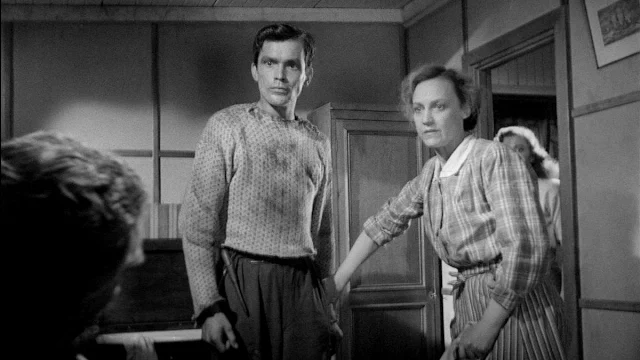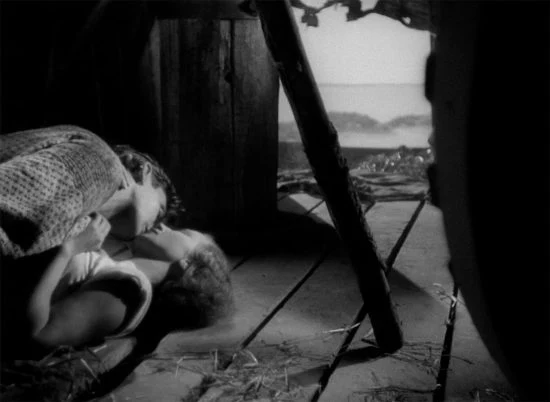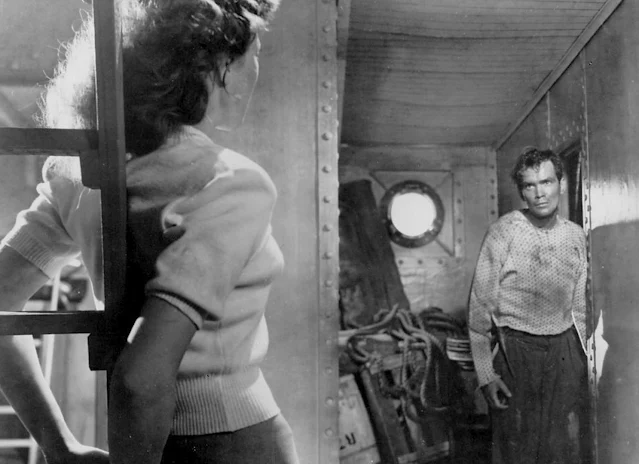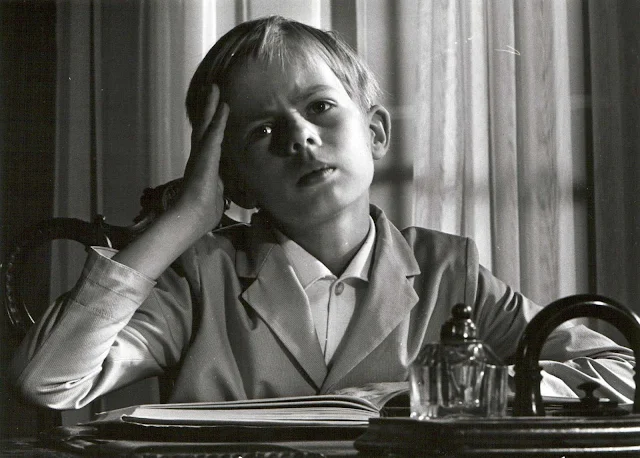Ingmar Bergman's Waiting Women is also known by its slightly racier American title, Secrets of Women. Both titles are apt. Four women are waiting at the summer home of the Lobelius family for their husbands to arrive. Each is married to one of the four Lobelius brothers, who run the family business. When Annette (Aino Taube) complains about the lack of intimacy in her marriage to Paul (Håkan Westergren), the other three respond with stories about their marriages. Rakel (Anita Björk) tells how her confession to an affair with an old flame caused her husband, Eugen (Karl-Arne Holmsten), to threaten suicide. Marta (Maj-Britt Nilsson) tells of her affair with the youngest of the Lobelius brothers, Martin (Birger Malmsten), who wanted to break free from the family business and become an artist in Paris. Marta discovered that she was pregnant with Martin's child, but when she went to tell him, his brothers had just arrived to tell him that their father has died and he's needed back home to run the company. She decided to have the baby on her own, but Martin returned to marry her. The oldest, Karin (Eva Dahlbeck), tells of attending a party with her husband, Fredrik (Gunnar Björnstrand), who scolded her on the way home afterward for wearing a dress that he thinks is too décolleté. We have already seen how pompous Fredrik can be in the scene in which the brothers try to persuade Martin to give up la vie bohème and join the business, but Fredrik loosens up a lot when he and Karin are trapped overnight in an elevator. It's one of Bergman's best early films, with his usual bittersweet comedy touch that he would perfect in Smiles of a Summer Night (1955), though it's decidedly pre-feminist in its outlook: Contemporary viewers may wonder why marriage seems to be the only object in view for these intelligent women.
A blog formerly known as Bookishness / By Charles Matthews
"Dazzled by so many and such marvelous inventions, the people of Macondo ... became indignant over the living images that the prosperous merchant Bruno Crespi projected in the theater with the lion-head ticket windows, for a character who had died and was buried in one film and for whose misfortune tears had been shed would reappear alive and transformed into an Arab in the next one. The audience, who had paid two cents apiece to share the difficulties of the actors, would not tolerate that outlandish fraud and they broke up the seats. The mayor, at the urging of Bruno Crespi, explained in a proclamation that the cinema was a machine of illusions that did not merit the emotional outbursts of the audience. With that discouraging explanation many ... decided not to return to the movies, considering that they already had too many troubles of their own to weep over the acted-out misfortunes of imaginary beings."--Gabriel García Márquez, One Hundred Years of Solitude
Search This Blog
Showing posts with label Birger Malmsten. Show all posts
Showing posts with label Birger Malmsten. Show all posts
Saturday, July 27, 2024
Waiting Women (Ingmar Bergman, 1952)
Cast: Anita Björk, Eva Dahlbeck, Maj-Britt Nilsson, Birger Malmsten, Gunnar Björstrand, Karl-Arne Holmsten, Jarl Kulle, Aino Taube, Håkan Westergren, Gerd Andersson, Björn Bjelfvenstarm. Screenplay: Ingmar Bergman, Gun Grut. Cinematography: Gunnar Fischer. Production design: Nils Svenwall. Film editing: Oscar Rosander. Music: Erik Nordgren.
Sunday, June 30, 2024
Thirst (Ingmar Bergman, 1949)
Cast: Eva Henning, Birger Malmsten, Birgit Tengroth, Hasse Ekman, Bengt Eklund, Gaby Stenberg, Naima Wilfstrand. Screenplay: Herbert Grevenius, based on stories by Birgit Tengroth. Cinematography: Gunnar Fischer. Production design: Nils Svenwall. Film editing: Oscar Rosander. Music: Erik Nordgren.
Monday, June 17, 2024
A Ship to India (Ingmar Bergman, 1947)
Cast: Holger Löwenadler, Anna Lindahl, Birger Malmsten, Gertrud Fridh, Naemi Briese, Hjördis Patterson, Lasse Krantz, Jan Molander, Erik Hell, Åke Fridell, Douglas Håge. Screenplay: Ingmar Bergman, based on a play by Martin Söderhjelm. Cinematography: Göran Strindberg. Production design: P.A. Lundgren. Film editing: Tage Holmberg. Music: Erland von Koch.
Saturday, March 23, 2019
The Silence (Ingmar Bergman, 1963)
The Silence (Ingmar Bergman, 1963)
Cast: Ingrid Thulin, Gunnel Lindblom, Jörgen Lindström, Håkan Jahnberg, Birger Malmsten. Screenplay: Ingmar Bergman. Cinematography: Sven Nykvist. Production design: P.A. Lundgren. Film editing: Ulla Ryghe. Music: Ivan Renliden.
Saturday, August 4, 2018
Summer Interlude (Ingmar Bergman, 1951)
 |
| Maj-Britt Nilsson in Summer Interlude |
Henrik: Birger Malmsten
David Nyström: Alf Kjellin
Kaj: Annalisa Ericson
Uncle Erland: Georg Funkquist
Ballet Master: Stig Olin
Henrik's Aunt: Mimi Pollak
Aunt Elisabeth: Renée Björling
Priest: Gunnar Olsson
Director: Ingmar Bergman
Screenplay: Ingmar Bergman, Herbert Grevenius
Cinematography: Gunnar Fischer
Production design: Nils Svenwall
Film editing: Oscar Rosander
Music: Erik Nordgren
Maj-Britt Nilsson gives a stunning performance as the ballerina haunted by death -- both the literal death of the young man with whom she once had the titular summer interlude and the slow death of her career, which depends on the youthful vitality she can feel beginning to slip away. Like Ingmar Bergman's earlier To Joy (1950), which starred Nilsson and many of the same actors, it's a fable about art and life, about the conflict of the public persona of a career with the personal needs of an intimate relationship. Unlike To Joy, in which Nilsson's character is subordinate to that of her musician husband, Bergman has shifted the focus to the woman -- a focus that he would maintain for most of his remaining career. Summer Interlude may be his first great film, and Nilsson's ability to move from the winsome young Marie -- sometimes evoking the young Audrey Hepburn -- to the toughened, successful prima ballerina is remarkable. Perhaps the most startling moment comes when the older Marie removes her stage makeup, which has the effect of making her look older and harder, to reveal the remaining traces of the younger woman -- a fine reversal of the usual film trope of removing the makeup to reveal the effects of aging.
Friday, April 6, 2018
To Joy (Ingmar Bergman, 1950)
 |
| Victor Sjöström, Maj-Britt Nilsson, and Stig Olin in To Joy |
Marta Olsson: Maj-Britt Nilsson
Sönderby: Victor Sjöström
Marcel: Birger Malmsten
Mikael Bro: John Ekman
Nelly Bro: Margit Carlqvist
Director: Ingmar Bergman
Screenplay: Ingmar Bergman
Cinematography: Gunnar Fischer
Production design: Nils Svenwall
Film editing: Oscar Rosander
Not long ago, while watching some YouTube videos of symphony orchestra performances, I was struck by how few women players were in the ranks of the great orchestras of Berlin and Vienna, especially in comparison to the numbers of women in the equivalent orchestras of New York, Boston, and Chicago. Even when the soloist was an Anne-Sophie Mutter or a Julia Fischer, the ranks of players behind her were almost exclusively male. It didn't take much Googling to learn that the fact hasn't escaped the notice of women musicians, especially in Europe. So I wasn't surprised when the crusty old conductor played by Victor Sjöström in Ingmar Bergman's To Joy introduced Marta Olsson, a new member of his orchestra, by commenting that her talent was "against nature." Eventually, Marta gives up her profession to raise the children she and fellow musician Stig Eriksson produce, while (mostly) patiently suffering his ego and infidelity. He's the one who, though tormented by the fear that he's mediocre, tries to move from the orchestra into a concert soloist, suffering a crushing setback when his attempt at performing the Mendelssohn violin concerto ends in disaster. The film is a flashback to their marriage after she dies, and though he's softened a bit by her kindness and good nature, he retains his egotism and self-doubt in equal measures. It's easy enough to see Stig Eriksson as the director's self-portrait, coming as it does after the failure of his second marriage. "Joy" is not an emotion that we readily associate with Bergman, though in this film it's an allusion to the final choral movement of Beethoven's ninth symphony, an excerpt from which is performed at the end of the film. The Freude of Beethoven (and of the Schiller poem that he set to music) is an emanation of the divine, emerging after struggle and pain, and Bergman tries to embody it in Stig and Marta's young son, sitting alone in the concert hall as the orchestra rehearses the symphony. It's a conclusion that teeters on the edge of sentimentality, as Bergman's invocations of the innocence of childhood often do. Still, though a lot of things in the film don't work, such as a resort to a voiceover commentary on the marriage of Stig and Marta by the conductor Sönderby that feels jarringly out of place when it occurs, To Joy is a long early step toward the mastery of Bergman's later films.
Subscribe to:
Comments (Atom)






































